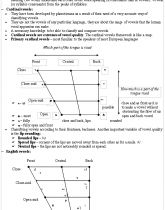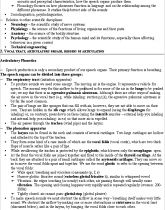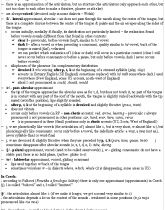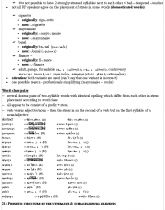Poznámky: English Phonetics
Skrýt detaily | Oblíbený- Kvalita:79,1 %
- Typ:Poznámky
- Univerzita:Univerzita Karlova v Praze
- Fakulta:Filozofická fakulta
- Kategorie:Jazyky
- Podkategorie:Angličtina
- Předmět:Fonetika angličtiny
- Autor:eliskabila
- Rozsah A4:44 strán
- Zobrazeno:1 782 x
- Stažené:0 x
- Velikost:0,4 MB
- Formát a přípona:MS Office Word (.doc)
- Jazyk:anglický
- ID projektu:2463
- Poslední úprava:06.12.2013
Phonetics
Phonetics is the science that studies speech sounds. More accurately - it studies the sounds of human speech. The science that deals with sounds of apes as well as other mammals, birds, insects, etc., is called bio phonetics.
It is concerned with how speech sounds can be categorized, how they are generated in the human vocal tract, why they each sound so different to the listener and how the listener is bale to recognize them.
Although it is quite obvious, that language consists of sounds, it wasn’t until the 20th century that the speech sounds became the main focus of linguistic investigation.
19th century linguists were more interested in written language. Only with the work of the Swiss linguist Ferdinand de Saussure in the early 20th century did linguists recognize the primacy of sound in human language and the secondary, superficial nature of writing.
Phoneticians have their own organization – The IPA – International Phonetic Association .
It is the major as well as the oldest representative organization for phoneticians.
It was established in 1886 in Paris.
The aim of IPA is to promote the scientific study of phonetics and the various practical applications of the science.
There are four main approaches to the sound:
1. Acoustic point of view - the study of the physical properties of sounds, the airwave frequencies of which sounds consist. The frequency of vibrations measured in hertz; volume of sound measured in decibels.
2. Auditory point of view - the study of how sounds are perceived by the human ear or recognised by the brain.
3. Articulatory point of view - the study of how sounds are produced by the vocal apparatus.
4. Phonology – functional phonetics, study of the organisation of speech sounds in a language
Except the main three branches of phonetics we speak for example about:
Historical phonetics: it involves the study of sound changes in words. There is a constant mutation over time in the pronunciation of words in all languages. The way we pronounce words in English today is vastly different from the pronunciation of English from 300 to 1700.
Physiological phonetics: it involves the study of how our speech organs work during the process of speaking. To know how the muscles and nerves of the speech organs work is especially important to fully understand their function during the production of speech.
Applied phonetics – teaching, using in technology – e.g. telecommunication, forensic expertise,...
The purpose of study – to explore human speech.
People create speech and phoneticians are here to explain how the intent to say something (which is in our brain) turns into a particular set of noises. Phoneticians also search how to explain the way speech sounds are understood.
Phoneticians study in detail the physical characteristics of sounds. Phoneticians record and then analyse the physical characteristics of a particular speech. With today’s rapid development of technology, the analysis of sounds is more and more easy and helps us bit by bit to understand better the sound structure of a language.
Phonetics is the science that studies speech sounds. More accurately - it studies the sounds of human speech. The science that deals with sounds of apes as well as other mammals, birds, insects, etc., is called bio phonetics.
It is concerned with how speech sounds can be categorized, how they are generated in the human vocal tract, why they each sound so different to the listener and how the listener is bale to recognize them.
Although it is quite obvious, that language consists of sounds, it wasn’t until the 20th century that the speech sounds became the main focus of linguistic investigation.
19th century linguists were more interested in written language. Only with the work of the Swiss linguist Ferdinand de Saussure in the early 20th century did linguists recognize the primacy of sound in human language and the secondary, superficial nature of writing.
Phoneticians have their own organization – The IPA – International Phonetic Association .
It is the major as well as the oldest representative organization for phoneticians.
It was established in 1886 in Paris.
The aim of IPA is to promote the scientific study of phonetics and the various practical applications of the science.
There are four main approaches to the sound:
1. Acoustic point of view - the study of the physical properties of sounds, the airwave frequencies of which sounds consist. The frequency of vibrations measured in hertz; volume of sound measured in decibels.
2. Auditory point of view - the study of how sounds are perceived by the human ear or recognised by the brain.
3. Articulatory point of view - the study of how sounds are produced by the vocal apparatus.
4. Phonology – functional phonetics, study of the organisation of speech sounds in a language
Except the main three branches of phonetics we speak for example about:
Historical phonetics: it involves the study of sound changes in words. There is a constant mutation over time in the pronunciation of words in all languages. The way we pronounce words in English today is vastly different from the pronunciation of English from 300 to 1700.
Physiological phonetics: it involves the study of how our speech organs work during the process of speaking. To know how the muscles and nerves of the speech organs work is especially important to fully understand their function during the production of speech.
Applied phonetics – teaching, using in technology – e.g. telecommunication, forensic expertise,...
The purpose of study – to explore human speech.
People create speech and phoneticians are here to explain how the intent to say something (which is in our brain) turns into a particular set of noises. Phoneticians also search how to explain the way speech sounds are understood.
Phoneticians study in detail the physical characteristics of sounds. Phoneticians record and then analyse the physical characteristics of a particular speech. With today’s rapid development of technology, the analysis of sounds is more and more easy and helps us bit by bit to understand better the sound structure of a language.




